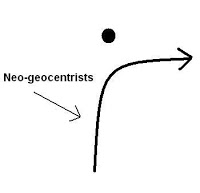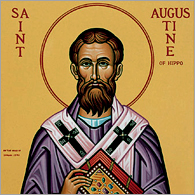 Bob Sungenis and “johnmartin” have issued lengthy “rebuttals” to my two pieces, The New Geocentrism: Excessive Interest in Usury Comes to Naught and Geocentric Exaggerations: The Catechism of Trent (see here and here). I have to put “rebuttals” in quotes because, although both men deployed a great many words and both would probably claim that I have been “answered” and decisively so, the fact remains that neither individual actually engaged the central points I was making.
Bob Sungenis and “johnmartin” have issued lengthy “rebuttals” to my two pieces, The New Geocentrism: Excessive Interest in Usury Comes to Naught and Geocentric Exaggerations: The Catechism of Trent (see here and here). I have to put “rebuttals” in quotes because, although both men deployed a great many words and both would probably claim that I have been “answered” and decisively so, the fact remains that neither individual actually engaged the central points I was making.
The core points that they missed are:
1) The Roman Catechism doesn’t teach geocentrism, Copernican heliocentrism, or any other specific cosmological theory.
On this point, in vintage style, Sungenis deploys a number of debater’s tricks to hide the fact that I plainly demonstrated that the Roman Catechism does not teach geocentrism or any other specific cosmological system. As such, he totally misses the point when he concludes, “Pius V didn’t say one word about heliocentrism in his catechism, so why is Mr. Palm arguing that Pius V was accommodating heliocentrism? Arguments from silence work both ways.” I’ve repeatedly stated that the Catholic Church doesn’t teach any theory regarding celestial motion as a matter of faith, that Catholics have freedom in this regard. The whole point that Sungenis studiously avoided is that the Catechism uses generic language that doesn’t dogmatise any one theory.
It’s a common debater’s trick to try and shift the burden of proof to his opponent. But remember that it was Sungenis who claimed that the Roman Catechism contains, “One of the clearest official and authoritative statements from the Catholic Church defending the doctrine of geocentrism…” and speaks of the “Roman Catechism’s dogmatic assertion of geocentrism”. Obviously, with a build-up like that, the burden of proof is squarely on him to show just where this clear and dogmatic assertion of geocentrism exists in the Catechism.
The problem is that he can’t.
As I laid out in my original article, there are a number of passages cited by the new geocentrists to try to find geocentrism in the Roman Catechism. But even Sungenis has to admit that there is doubt about what these actually mean. So he deploys what he considers to be the show-stopper—the “foundations of the earth” passage—which he claims will, “expel any doubt about what objects are revolving”. The problem is that I demonstrated that this passage has nothing to do with the position of the globe in relation to the universe, but speaks of the position of dry land in relation to water on the surface of the earth. As I said there, “If ‘earth’ here means the entire globe then the passage ceases to make sense, since in the last sentence the ‘earth’ is specifically contrasted with the ‘air’ and ‘water’ and God certainly didn’t cover the entire globe, including the air and water, ‘with trees and every variety of plant and flower’.”
What does Sungenis say to this demonstration?
Sure, I’ll grant to Mr. Palm that ‘mundus’ could refer to the earth and earth could refer to the land. But that doesn’t get him off the hook with the previous passage that says the sun, moon and stars revolve around the earth. Mr. Palm’s mundus could either mean earth or universe, but the burden of proof is on him to show that it means earth since the catechism has already stated it believes the sun, moon and stars revolve around the earth.
But the careful reader will notice that Sungenis has added the words “around the earth” to the Catechism because that’s what he needs it to say in order to support geocentrism. The fact is, the Catechism never uses such words. Instead, it uses generic phrases like “certain and uniform course”, “continual revolution”, “fixed and regular motion”, “motion and revolutions” with respect to the heavenly bodies. And these would apply just as well to the pre-Tridentine theories of Bishop Nicolas Oresme and Cardinal Nicolas Cusa as they would to Copernican heliocentrism and more modern acentric cosmologies. In other words, the Catechism does not teach anything with respect to any one scientific theory—that was not the intent of those passages.
This answers Sungenis’s other off-point comment, “As such, Mr. Palm will also have to accept the fact that he cannot interpret land and earth literally in the catechism and then interpret the sun, moon and stars moving around the earth non‐literally.” Wrong. There are really two ways to answer this. First, the Magisterium teaches that the Holy Spirit did not put specifics about “the essential nature of the things of the visible universe” into sacred Scripture. Rather, they are depicted according to “what comes under the senses” (Providentissimus Deus 18). We cannot really expect more from the Roman Catechism than what we get from sacred Scripture itself concerning the precise details of celestial motions. But second, the motions are literal, it’s just that the Catechism does not give specifics about those motions. Can Sungenis prove that the theories of Bishop Oresme and Cardinal Cusa are excluded by the Roman Catechism? No, he can’t. It is he who reads subsequent controversies and his own cosmological biases back into the Roman Catechism and adds words that are not there, to make the Catechism say what he wants it to say.
But more importantly, notice how Sungenis plays both ends against the middle. He had already implicitly acknowledged that the other passages are not clear, that there was “doubt” that needed to be expelled. So he deployed the “foundations of the earth” passage which, he claimed, will “expel any doubt about what objects are revolving”. But I proved that that passage has nothing to do with the motions of celestial bodies. Sungenis did not even engage my exegetical argument. (Neither did “johnmartin”.) Instead, he circles back around to claim that the passages that he acknowledged are doubtful are now clear enough to support the meaning of this passage: “the burden of proof is on [Palm] to show that it means earth since the catechism has already stated it believes the sun, moon and stars revolve around the earth.” The problem for Sungenis is that I did prove just that.
The bottom line is that the Catechism’s language accommodates more than one cosmological view, because the Catholic Church does not teach any one cosmology as a matter of faith. Sungenis huffs that “Even die‐hard modernists admit that the Tridentine catechism teaches geocentrism. They just don’t want to accept it, but at least they are not foolish enough to force the catechism into a mold that it cannot hold.”
But I categorically deny that the Roman Catechism teaches geocentrism or any cosmology at all and the arguments that I have deployed to demonstrate that apply every bit as much to the modernists as to the new geocentrists. But the fact that Sungenis will side with the Church’s enemies in order to save his “pebble” of geocentrism pretty much proves my point: “The geocentrist fixation on their pet cause is like a monkey who reaches into a precious Ming vase to grasp a pebble. Intent only on holding onto that bit of rock and unable to extract his clenched fist, the monkey will happily smash the vase to get his “prize”, heedless of the priceless nature of the treasure he has wrecked.”
2) There is no instance in which the Magisterium of the Church has for centuries ceased to teach a doctrine of the Catholic faith.
In The New Geocentrism: Excessive Interest in Usury Comes to Naught I pointed to instances in which geocentrists attack the very Magisterium of the Church in order to explain their anomalous position. “johnmartin” deployed a whole list of doctrines which he claims the Catholic Church has “de facto denied” and speaks of “church [sic] silence” prompted by “inept leadership or fear of the science establishment”. Rick Delano speaks of “surrender” and “abandoning” of “binding doctrines” and “dogmas” put forth by the “ordinary magisterium”. And yet I have shown how, in each and every case, the Magisterium of the Church has explicitly reaffirmed the examples they propose, right up to the present day. This leaves geocentrism standing in utter isolation as the lone alleged exception to the rule. But the geocentrists are simply wrong: it is not an exception at all because geocentrism is not now and never has been taught as a matter of faith by the Catholic Church, in either her ordinary or extraordinary Magisterium. The Magisterium of the Catholic Church teaches 100% of the doctrines of the Faith. That she does not teach geocentrism demonstrates that never has been part of the Faith. The new geocentrism is exactly as I have described it many times in discussions on the Catholic Answers Forum—an elaborate exercise in special pleading, both scientifically and ecclesiastically.
Now “johnmartin” and Sungenis consistently miss this point. The former seeks to blunt my criticism of his extreme statements by appealing to what happens on the “local level”. For the record, that is not what he said before. What he said was, “I’ve presented a list of doctrines that have been de facto denied by the modern church” and “I believe the church silence on the matter of geo[centrism] in the last 300 years is easily accounted for through either inept leadership or fear of the science establishment”. I don’t see any disclaimers in there about this only happening on the “local level”. As such, his new argument seems to be a tacit recognition that his original argument was false. And it’s interesting that this alleged ineptitude and cowardice didn’t prevent the Magisterium from explicitly teaching on a wide range of volatile and controversial topics, from contraception to homosexuality to divorce and remarriage. Are we to believe that this alleged failure of competence and nerve is reserved only for geocentrism? Again, this is just one more instance of geocentric special pleading.
Regardless, now “johnmartin” complains that he’s been misunderstood. For example:
It is in this context that geocentrist claim that the doctrine of the stationary earth has been dropped in practice (in so far as it is not taught at the local level),…
and
Geocentrism is then only one part of a larger problem within the church. The doctrine of geocentrism has not been taught at the local level for some time, but then again, many other doctrines have also not been taught for a long time either.
It is true that on “the local level” many things have broken down in many parts of the world in the Catholic Church. But let’s be clear. We aren’t talking about “the local level” with respect to geocentrism. We’re talking about what the universal Magisterium of the Catholic Church presents to the faithful as matters of faith. And I demonstrated that, while the Church certainly does not teach geocentrism as a matter of faith, she has reiterated her teaching formally in each and every example that “johnmartin” presented as supposed parallels.
Similarly, Sungenis deflects from the core issue by speaking of “what is actually being taught in many Catholic institutions”. But that is not what we’re talking about. We are talking about what is taught by the Catholic Magisterium, to the universal Church. The Catholic Church teaches 100% of the doctrines of the faith to the universal Church. She does not teach geocentrism. Ergo, geocentrism is not part of the Catholic faith. Period.
If the geocentrists actually could come up with a doctrine of the faith that the Magisterium had not publicly affirmed for many centuries, then they would at least have a parallel. They can’t. Most Catholics would rejoice in the fact that, even in these dark and difficult times the Catholic Church continues to teach, publicly and solemnly, all the doctrines of our faith.
But not the geocentrists (or at least not these geocentrists). This fact is a cause of great vexation to them and so they instead scramble to manufacture whatever difficulties they can imagine. To them, geocentrism must be defended at all costs. Why is that so? What has led them to such fanaticism?
At least two reasons suggest themselves. First, some of these individuals have staked their very reputations on geocentrism. Perhaps they feel they’ve reached the point of no return and have no choice but to defend it to the bitter end. Second, they’ve also presented geocentrism in such a way that their personal faith in the Catholic Church is dependent upon it. In their view, if geocentrism is not true then the Catholic Church isn’t indefectible.
This latter problem particularly concerns me in that others who have the misfortune of encountering such misguided geocentrist fanaticism—whether practicing Catholics or those considering the Catholic faith—may also be adversely affected. I know this from private notes I have received to date. But this “all or nothing” approach is, of course, a product of manifest geocentrist exaggeration as to the authority and nature of the ecclesiastical documents that address geocentrism. For the Catholic who knows his faith, the truth or falsehood of geocentrism has no impact whatsoever on his trust in the Catholic Magisterium.
Unfortunately, these geocentrists are heedless of the damage they may be doing to others’ trust in the Magisterium—all in order to open some glimmer of plausibility for their pet theory to be part of our faith. And this once again proves my point. To all appearances they will do anything to hang on to the “pebble” of their private fixation on geocentrism, even to the point of making a shipwreck of their faith and the faith of others.



